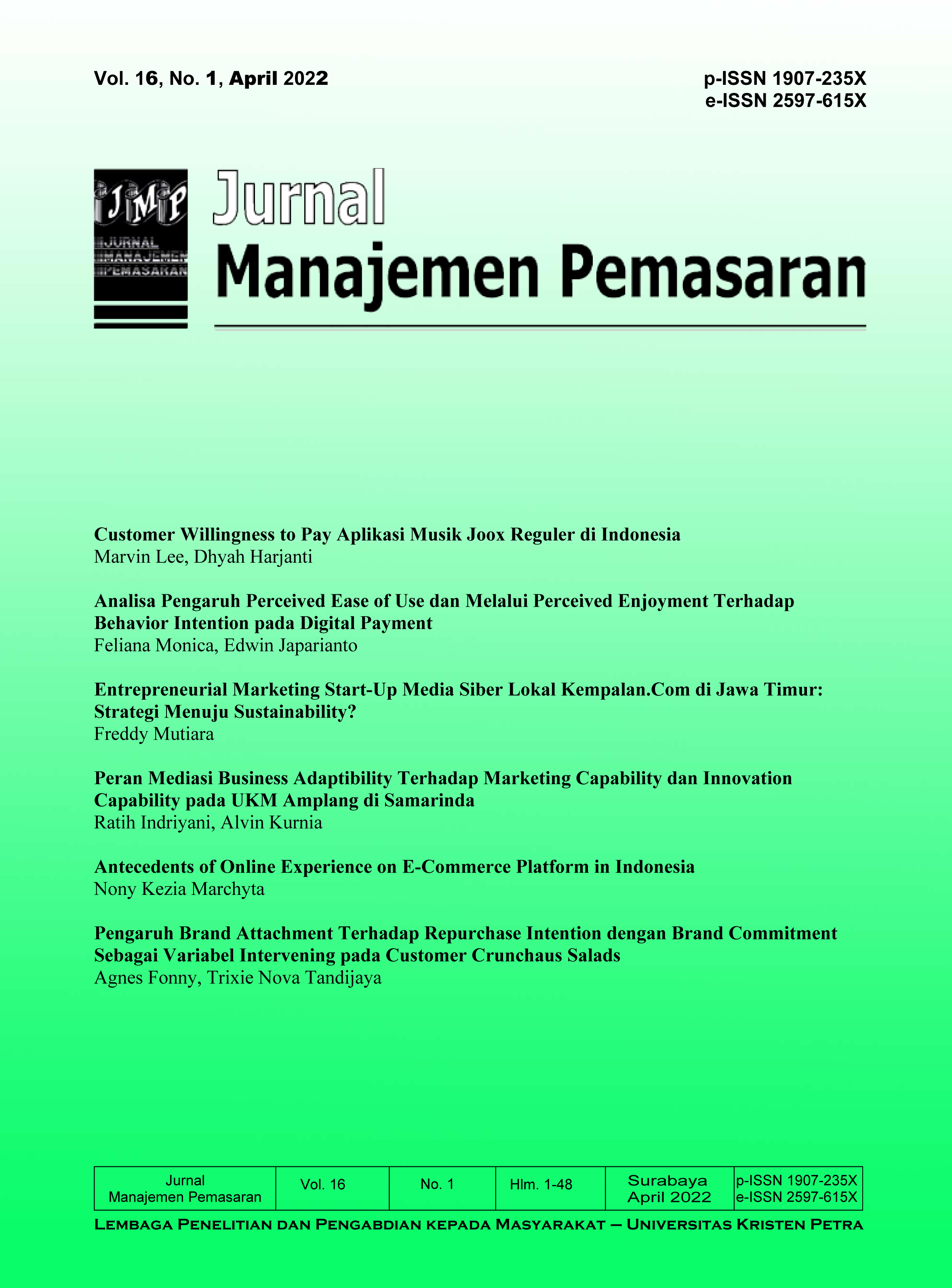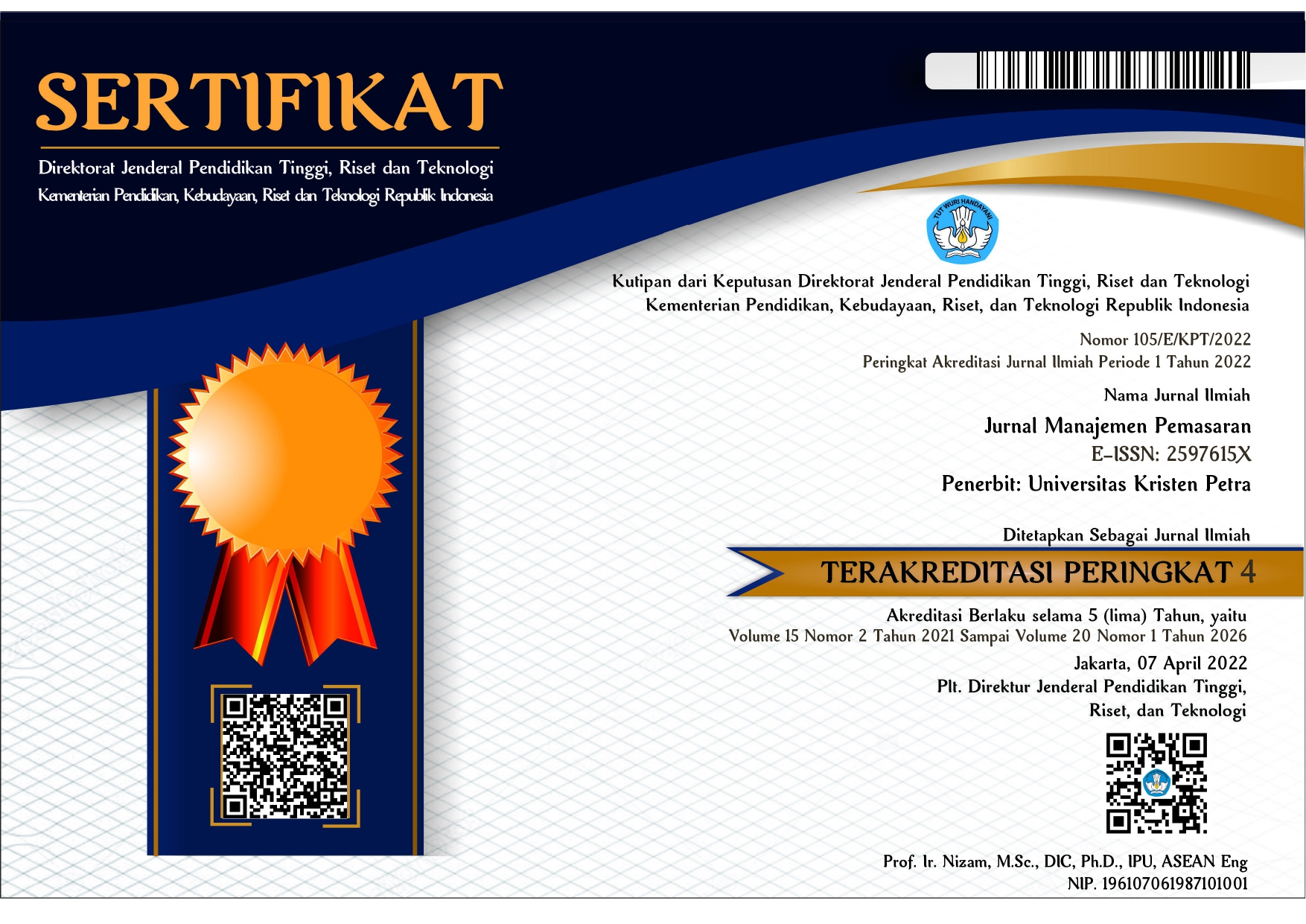ANTECEDENTS OF ONLINE EXPERIENCE ON E-COMMERCE PLATFORM IN INDONESIA
DOI:
https://doi.org/10.9744/pemasaran.16.1.32-36Keywords:
Perceived usability, perceived enjoyment, online social interaction, online experienceAbstract
The developments of online technology in Indonesia had transformed how businesses approach Indonesian customers, leading to the rise of e-commerce. This research was conducted by distributing questionnaires to 196 respondents who are a leading e-commerce platform in Indonesia. Multiple regression analysis had been used to test the hypotheses. The study found that perceived usability, perceived enjoyment, and online social interaction had a significant positive effect on the online experience. This study helps online shopping platforms to understand the opportunity to enhance the online experience of their customers.
Abstrak:
Perkembangan teknologi online di Indonesia telah mengubah cara bisnis dalam memikat pelanggan, yang mengarah pada lahirnya e-commerce. Penelitian ini dilakukan dengan mendistribusikan angket penelitian kepada 196 responden dari salah satu platform e-commerce terkemuka di Indonesia. Analisis regresi berganda digunakan untuk menguji hipotesis penelitian. Hasil penelitian ini menunjukkan bahwa perceived usability, perceived enjoyment, dan online social interaction memiliki pengaruh positif terhadap online experience. Hasil penelitian ini membantu platform online shopping untuk memahami kesempatan dalam meningkatkan pengalaman berbelanja online bagi para pelanggan.
References
Alcántara-Pilar, J. M., Blanco-Encomienda, F. J., Armenski, T., & Del Barrio-García, S. (2018). The antecedent role of online satisfaction, per-ceived risk online, and perceived website usabi-lity on the affect towards travel destinations. Journal of Destination Marketing and Management, 9(October 2015), 20–35. https://doi.org/10.1016/j.jdmm.2017.09.005
Bilgihan, A., Kandampully, J., & Tingting (Christina), Z. (2016). Towards A Unified Customer Experience in Online Shopping Environments: Antecedents and Outcomes. International Journal of Quality and Service Sciences, 8(1), 102–119. https://doi.org/doi.org/10.1108/IJQSS-07-2015-0054
Chung, N., Lee, H., Lee, S. J., & Koo, C. (2015). The influence of tourism website on tourists’ behavior to determine destination selection: A case study of creative economy in Korea. Technological Forecasting and Social Change, 96, 130–143. https://doi.org/10.1016/j.techfore.2015.03.004
Elmashhara, M. G., & Soares, A. M. (2019). The impact of entertainment and social interaction with salespeople on mall shopper satisfaction: The mediating role of emotional states. Inter-national Journal of Retail and Distribution Mana¬¬gement, 47(2), 94–110. https://doi.org/10.1108/IJRDM-06-2018-0112
García, J. A. C., Galindo, A. D. V., & Suárez, R. M. (2018). The effect of online and offline expe-riential marketing on brand equity in the hotel sector. Spanish Journal of Marketing - ESIC, 22(1), 22–41. https://doi.org/10.1108/SJME-03-2018-003
Giao, H. N. K., Vuong, B. N., & Quan, T. N. (2020). The influence of website quality on consumer’s e-loyalty through the mediating role of e-trust and e-satisfaction: An evidence from online shopping in Vietnam. Uncertain Supply Chain Manage-ment, 8(2), 351–370. https://doi.org/10.5267/j.uscm.2019.11.004
Jaiswal, S., & Singh, A. (2020). Influence of the Deter-minants of Online Customer Experience on Online Customer Satisfaction. Paradigm, 24(1), 41–55. https://doi.org/10.1177/0971890720914 121
Klaus, P. (2013). The case of Amazon.com: Towards a conceptual framework of online customer service experience (OCSE) using the emerging consensus technique (ECT). Journal of Services Marketing, 27(6), 443–457. https://doi.org/10. 1108/JSM-02-2012-0030
Minge, M., & Thüring, M. (2018). Hedonic and pragmatic halo effects at early stages of User Experience. International Journal of Human Computer Studies, 109, 13–25. https://doi.org/10.1016/j.ijhcs.2017.07.007
Nambisan, P., & Watt, J. H. (2011). Managing cus-tomer experiences in online product communities. Journal of Business Research, 64(8), 889–895. https://doi.org/10.1016/j.jbusres.2010.09. 006
No, E., & Kim, J. K. (2013). Determinants of The Adoption for Travel Information on Smartphone. International Journal of Tourism Research, 16(6), 534–545. https://doi.org/doi.org/10.1002/ jtr.1945
Rose, S., Clark, M., Samouel, P., & Hair, N. (2012). Online Customer Experience in e-Retailing: An empirical model of Antecedents and Outcomes. Journal of Retailing, 88(2), 308–322. https://doi.org/10.1016/j.jretai.2012.03.001
Suki, N. M., & Suki, N. M. (2007). Online Buying Innovativeness: Effects of Perceived Value, Perceived Risk and Perceived Enjoyment. Inter-national Journal of Business and Society, 8(2), 81–93.
Xia, M., Zhang, Y., & Zhang, C. (2018). A TAM-based approach to explore the effect of online experience on destination image: A smartphone user’s perspective. Journal of Destination Marketing and Management, 8(May), 259–270. https://doi.org/10.1016/j.jdmm.2017.05.002

















